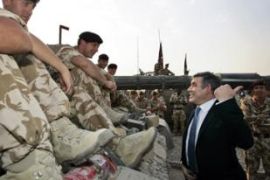Brown to make key Iraq statement
PM’s statement on troops expected as report labels UK’s Iraq strategy a “disaster”.

The revelation prompted claims that he had manipulated the media for party political or electoral gain.
‘Counterproductive’
The Oxford Research Group, a UK-based global security think-tank, said in a report on Monday that the US and its allies, including the UK, should rethink their policy on Iraq and Afghanistan as it had been a “disaster”.
| ORG report: Key points |
|
– Whatever the problems with Iran, war should be avoided at all costs. – The US-led war in Iraq was a “grievous mistake”. – The removal of the Taliban from power in Afghanistan has been of “direct value” to al-Qaeda. – The policy of “extraordinary rendition” of suspects in third-party countries outside US legal jurisdiction created a useful propaganda weapon. – The US and its allies need to better understand the roots of al-Qaeda and its support base. |
The report, Towards Sustainable Security: Alternative Approaches to the War on Terror, said that western strategy since the September 11 attacks had failed to extinguish the threat from Islamist extremism and had even helped fuel it.
Paul Rogers, the author of the report, said: “Every aspect of the war on terror has been counterproductive in Iraq and Afghanistan, from the loss of civilian life through mass detentions without trial.
“In short, it has been a disaster.
“Western countries simply have to face up to the dangerous mistakes of the past six years and recognise the need for new policies.”
Brown is scheduled to update MPs about British troop levels in southern Iraq in parliament at 1430GMT.
He will first have to negotiate what is expected to be a rigorous press briefing where he is likely to face accusations he lost his nerve over the weekend by deciding not to call an election for November 1 after poll ratings showed his popularity had fallen sharply.
Also on Monday, anti-war protesters were given an 11th hour go-ahead to stage a march to parliament after police had earlier threatened to use an old Victorian law to stop them.
The Stop the War Coalition said it had been given police permission to march from Trafalgar Square to parliament.
The authorities had effectively banned the march under the Metropolitan Police Act of 1839 which dates from the time of the Chartist protest movement, a period when the ruling class believed they were on the brink of social revolution.
“The ban’s been lifted,” a spokesman for Stop the War said as an estimated 2,000 to 3,000 people gathered in Trafalgar Square.
Celebrities, veteran peace campaigners and MPs are expected to join the anti-war campaigners for the march down Whitehall.
‘Weak and indecisive’
Labour MPs, many of whom are furious over the election debacle, which has given opposition politicians the chance to accuse Brown of being weak and indecisive.
Brown, who took over from Tony Blair three months ago, insisted he would have won an election had he decided to call it, but wanted time to carry out his policies first.
| Profile |
“The easiest thing I could have done is call an election. I could have called an election on competence … We could have won an election now or won an election sooner or later,” Brown said in an interview with the BBC.
“I believe the country deserves to see from us our vision of the future and our implementation of it.”
Speculation of an early vote grew over the past few weeks when polls showed Brown with an 11 percent lead over his Conservative rivals.
Growing frustration
The government rescheduled business to make an early vote possible, and Brown fuelled the speculation by refusing for weeks to rule it out.
David Cameron, the Conservative leader, said Brown was treating the public “like fools”.
Questions over Brown’s leadership come as frustration grows in the UK over the country’s involvement in Iraq.
Ben Griffin, the first member of the British army’s elite SAS to quit on moral grounds after tours in both Iraq and Afghanistan, told Al Jazeera there was a growing frustration among British troops in Iraq who he said were increasing asking: “what are we doing here?”
He said: “Obviously the troops who have been told they are coming home are going to be pleased about it.
“I think there is a sense within the troops that if any more die they will have died for nothing.”
Roger Bacon, a Briton whose son, a major in the intelligence corps, was killed in Iraq in 2005, told Al Jazeera he thought it was time for British troops to return home.
“As far as I am concerned, get them out of the country. We have to withdraw,” he said.
